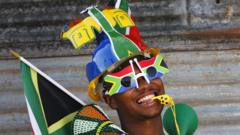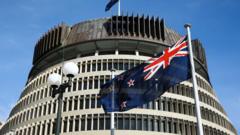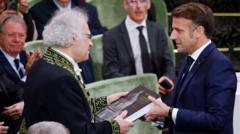NEW YORK (AP) — Language enthusiasts, rejoice! Merriam-Webster has officially announced a comprehensive update to one of its most cherished dictionaries, with the 12th edition of its Collegiate Dictionary set to be released on November 18. Following a 22-year gap since the last hard-copy update, this new edition boasts the addition of over 5,000 fresh words, among them 'petrichor', 'teraflop', 'dumbphone', and 'ghost kitchen'.
The term 'petrichor', for instance, represents the pleasant scent that lingers after a rainfall, while 'teraflop' is a unit measuring computer speed, and 'dumbphone' refers to mobile devices predating the smartphone era. Meanwhile, 'ghost kitchens', which emerged prominently during the pandemic, are now recognized spaces specifically for culinary businesses to operate without traditional storefronts.
Merriam-Webster’s latest update also includes popular new terms like 'cold brew', 'dad bod', 'adulting', and 'cancel culture'. The dictionary's entries will now feature enhanced definitions and over 20,000 new usage examples, reflecting changes already available on their website.
What Changes Were Made?
In adapting the dictionary to modern demands, the company has made strategic cuts, removing biographical and geographical sections that were deemed less relevant to users today. People are more likely to use online resources for quick facts like the location of Kalamazoo or the life of Nikolai Rimsky-Korsakov, said Greg Barlow, Merriam-Webster’s president.
Furthermore, outdated words have been eliminated, allowing more contemporary terms to take their place. The goal is to create a more engaging and functional reference tool, enhancing the browsing experience.
Dictionary Sales: The Current Landscape
Interestingly, the release of this updated dictionary comes amid a noted decline in sales for physical reference books, including dictionaries. According to Circana BookScan, sales of dictionaries fell 9% in the year ending September 6. Despite this, Merriam-Webster remains a leading force in the market, selling around 1.5 million copies of its dictionaries annually.
However, the nostalgia associated with having a physical dictionary remains strong, as noted by Barnes & Noble’s marketing manager, Kat Sarfas. There appears to be a continued desire for printed reference materials, such as dictionaries and even the U.S. Constitution, suggesting that many consumers still appreciate the tactile nature of physical books.
The Enduring Relevance of Print Dictionaries
While print dictionaries have faced challenges since the rise of the internet, Barlow remains optimistic about their role in society. He points out that print dictionaries serve functions beyond mere reference, such as preserving languages and cultures. For many communities, particularly Indigenous groups, having a print dictionary signifies the legitimacy of their language, said Lindsay Rose Russell, executive director of the Dictionary Society of North America.
Additionally, the new Collegiate edition aims to preserve some unique features users have grown fond of, including thumb notches for easy navigation. These changes reflect a balance between modern linguistic needs and the cherished traditions of old-school reference books.







